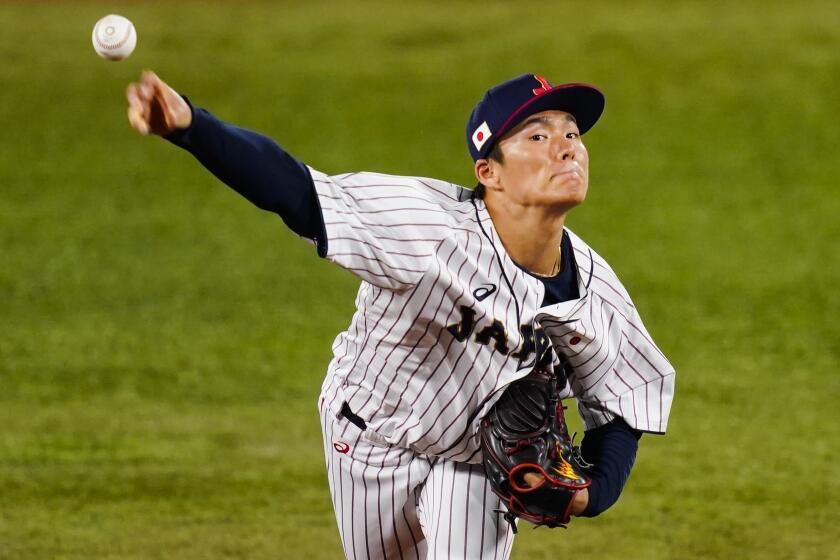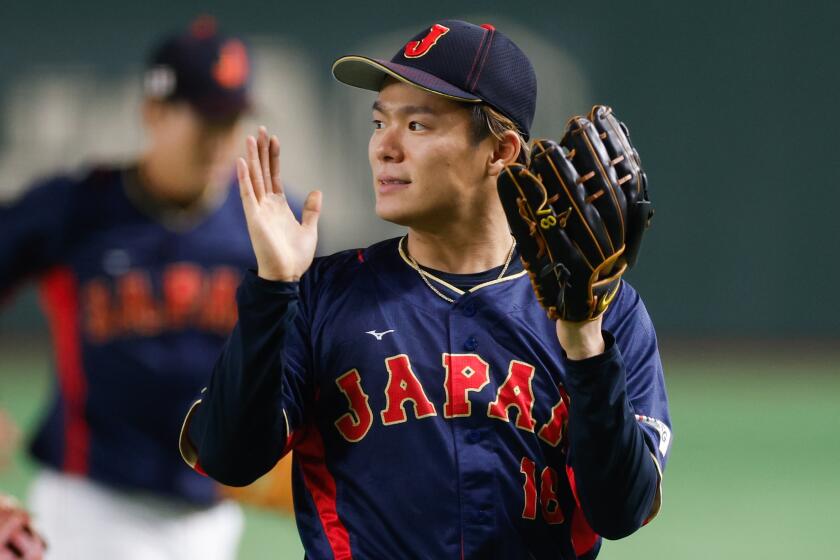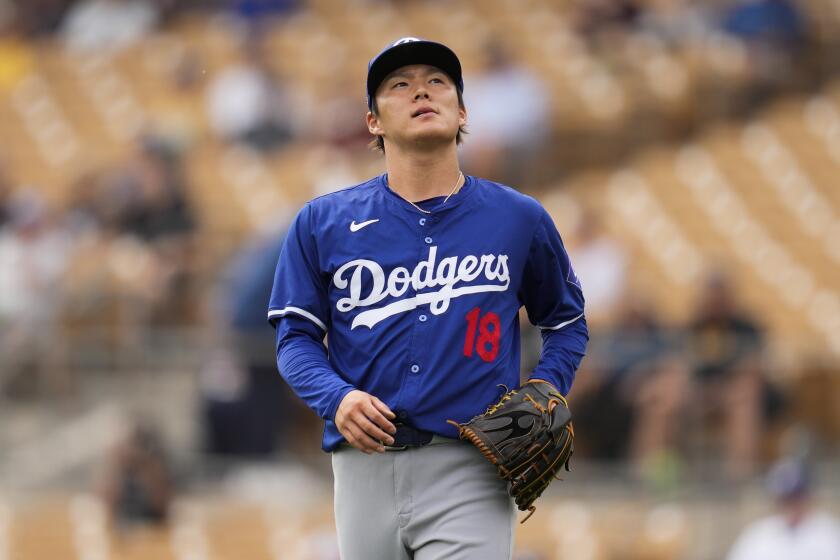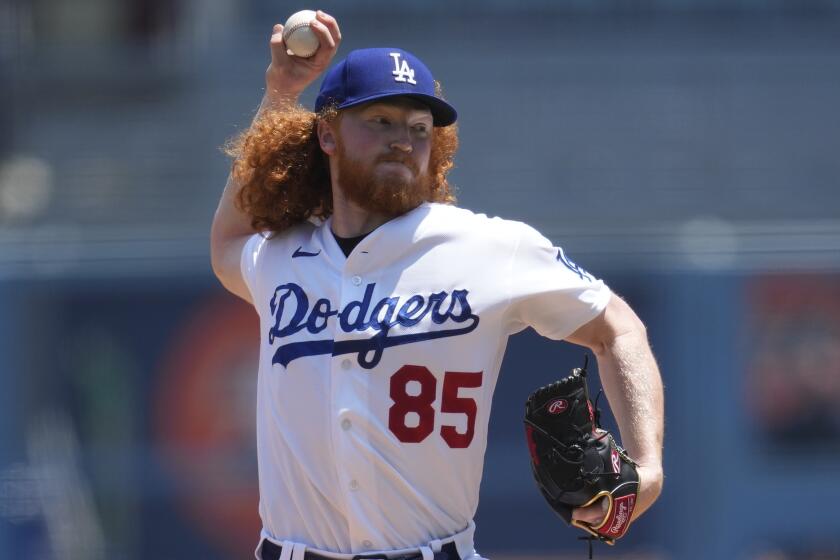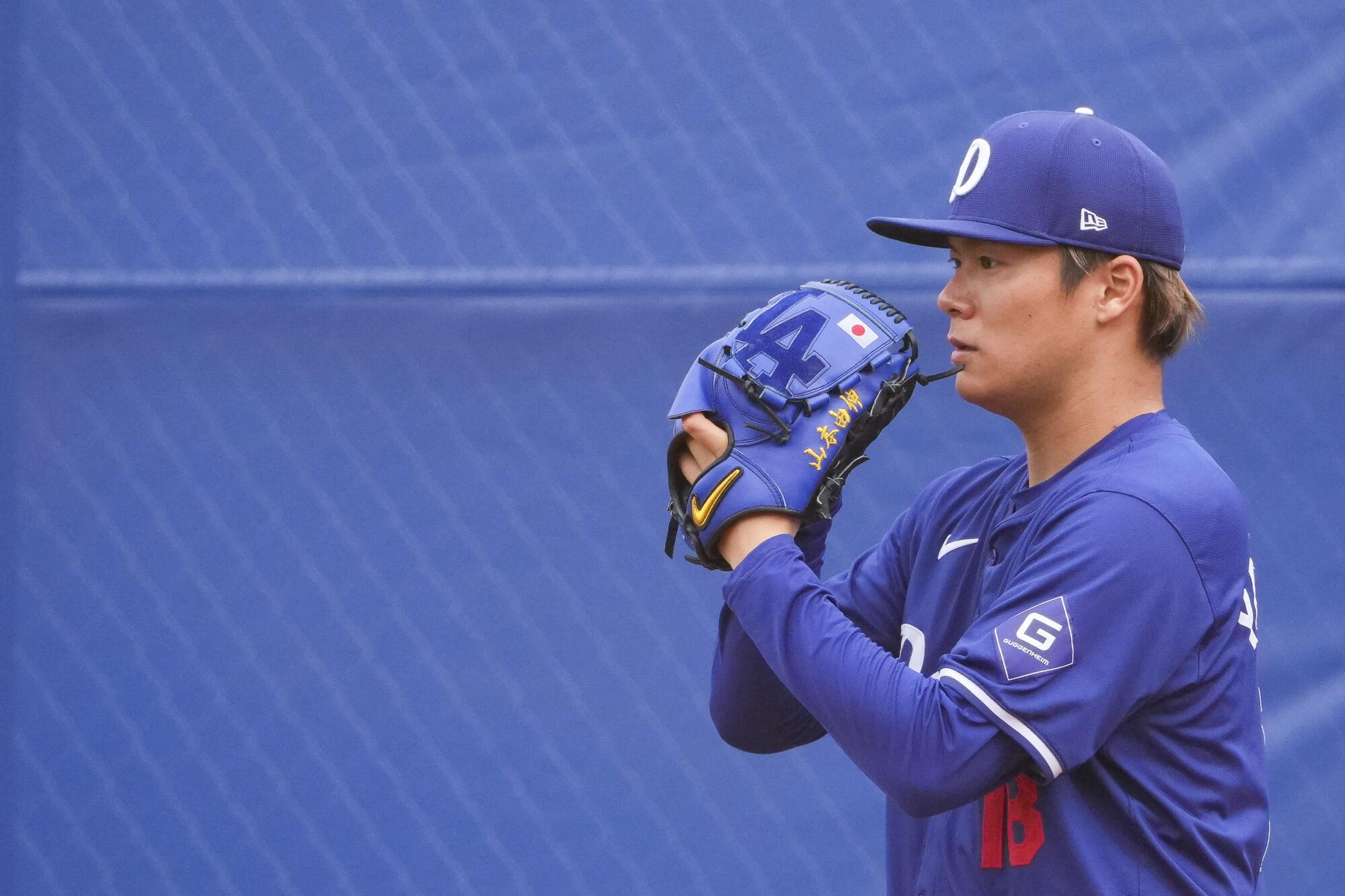
OSAKA, Japan — Yoshinobu Yamamato did what?
In the underground parking lot of Kyocera Dome after a recent exhibition game, Orix Buffaloes pitching coach Masafumi Hirai chuckled when recalling how he reacted to hearing that Yamamoto reported to spring training in 2018 with a new delivery.
“I was surprised,” Hirai said in Japanese.
The previous season had been viewed as a resounding triumph for Yamamoto, who dominated Japan’s minors and was elevated to the first team before the end of the year. The 5-foot-10 right-hander started five games for the Buffaloes, including one against Shohei Ohtani, who was in his final season in Nippon Professional Baseball.
“The No. 1 pitcher I faced this year,” Ohtani said at the time.
So why was Yamamoto overhauling his delivery? What was he thinking?
Japanese pitching ace Yoshinobu Yamamoto agreed to a deal with the Dodgers, joining the newly acquired Shohei Ohtani and Tyler Glasnow on the team.
“To be honest,” Hirai said, “he drastically changed after performing well the year before, so my first thought was, ‘Is this OK?’”
Hirai wasn’t alone.
The changes Yamamoto implemented were opposed by virtually everyone in the Buffaloes’ organization, from the front office to the coaching staff.
Yamamoto was only 19.
He was just a little more than a year removed from being a fourth-round draft choice.
He lacked the status and track record required to subvert authority in a country in which the orders of superiors are expected to be followed without question.
Yet he didn’t budge.
The choice to defy convention at such an early stage of his career came to define Yamamoto, who signed a $325-million contract with the Dodgers over the winter and is scheduled to start for them in the second game of their two-game series against the San Diego Padres in South Korea next week.
“He really understands what he wants to do and what his goals are, and he pursues them without wavering,” veteran Buffaloes reliever Yoshihisa Hirano said.
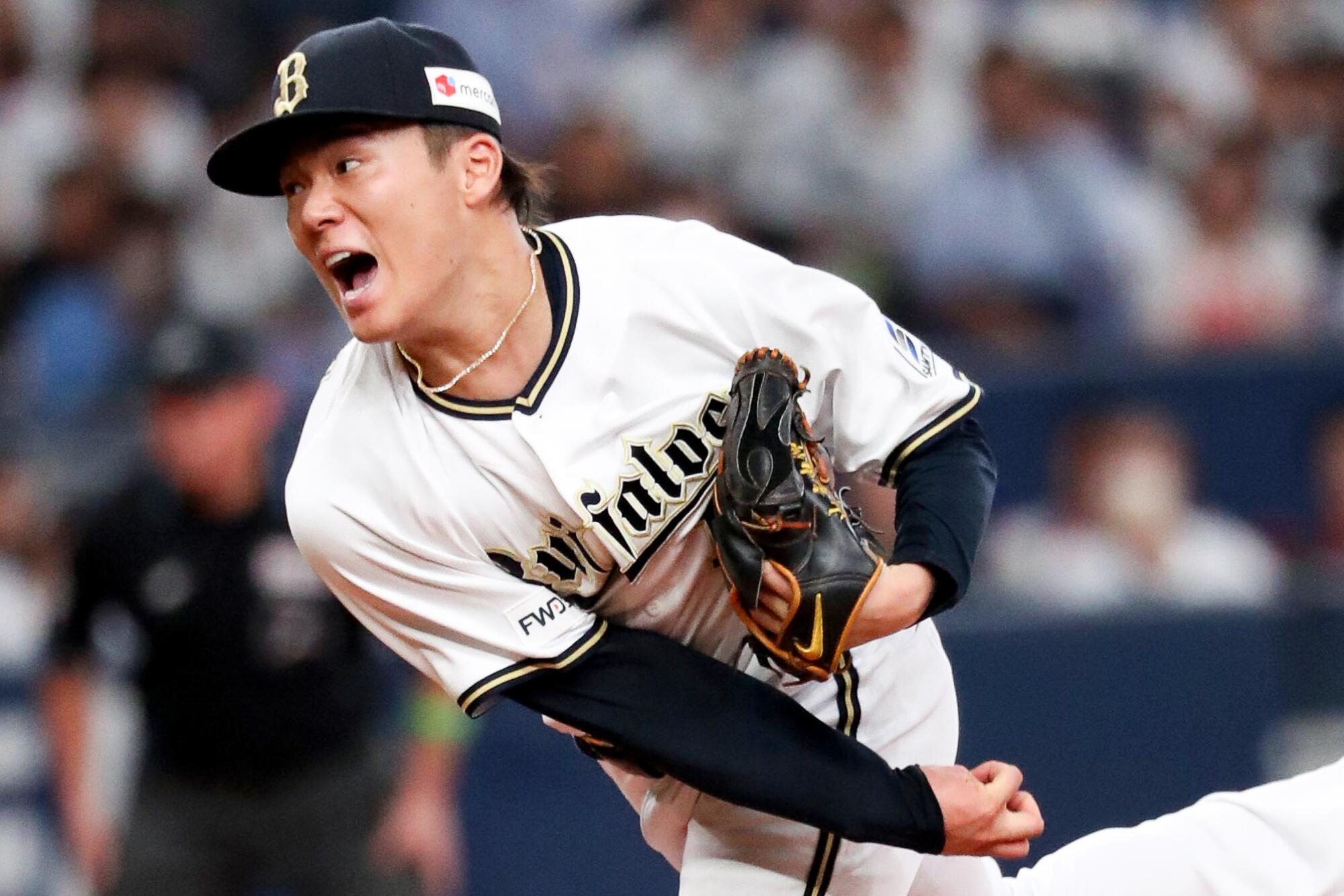
Yamamoto failed to win a place in the Buffaloes’ rotation in 2018 and was initially sent to the minors but later became a key contributor in the bullpen, registering a 2.89 earned-run average in 54 appearances. In time, he became the best pitcher in NPB, winning three consecutive Pacific League most valuable player awards.
“He delivered results that were good enough to make us shut up,” said Hirai, the pitching coach.
Yamamoto’s change in mechanics was inspired not only to enhance performance but also to prevent injury. He switched from a more traditional delivery to one in which he straightened his pitching arm when cocking it back, as if he was preparing to throw a javelin. By effectively transferring his weight forward, Yamamoto was able to deliver pitches in a manner that decreased the stress on his elbow.
Lars Nootbaar believes Dodgers pitcher Yoshinobu Yamamoto can be dominant, but scouts are torn on whether he can be an ace and avoid Tommy John surgery.
The technique and unorthodox exercises associated with them were developed by personal trainer Osamu Yada, who was introduced to Yamamoto by a longtime acquaintance. Yada remains by Yamamoto’s side to this day.
Yada’s training program includes a javelin and miniature soccer balls but no weights.
Yamamoto and Yada made another significant modification to his delivery again last year, exchanging a leg lift for a slide step toward the plate. By this point, Yamamoto had already won two Japanese equivalents of the Cy Young Award.
“A pitcher that good, you’d think he wouldn’t want to change,” Hirai said. “It’d be a different conversation if he was struggling.
“He’s doing it because he’s in search of something better.”
A look at Shohei Ohtani’s prolific baseball career, starting with his meteoric rise in Japan, his two-way stardom with the Angels and his eventual signing with the Dodgers.
The Buffaloes made no effort to deter him this time. Yamamoto won another Sawamura Award. Over the winter, he was signed by the Dodgers to the most lucrative MLB contract ever awarded to a pitcher.
“He’s never satisfied,” All-Star left-hander Hiroya Miyagi said.
What Miyagi and others found refreshing was how Yamamoto’s self-assurance on the field never translated into arrogance off of it.
“He’s serious about baseball,” Miyagi said. “Outside of that, he’s like a high schooler.”
Yamamoto liked to tease his teammates, according to Miyagi. If a player made an error, Yamamoto would joke, “You better hit.” Miyagi said he often pitched the day after Yamamoto, which would result in Yamamoto kidding him about how he better not end the Buffaloes’ winning streak.
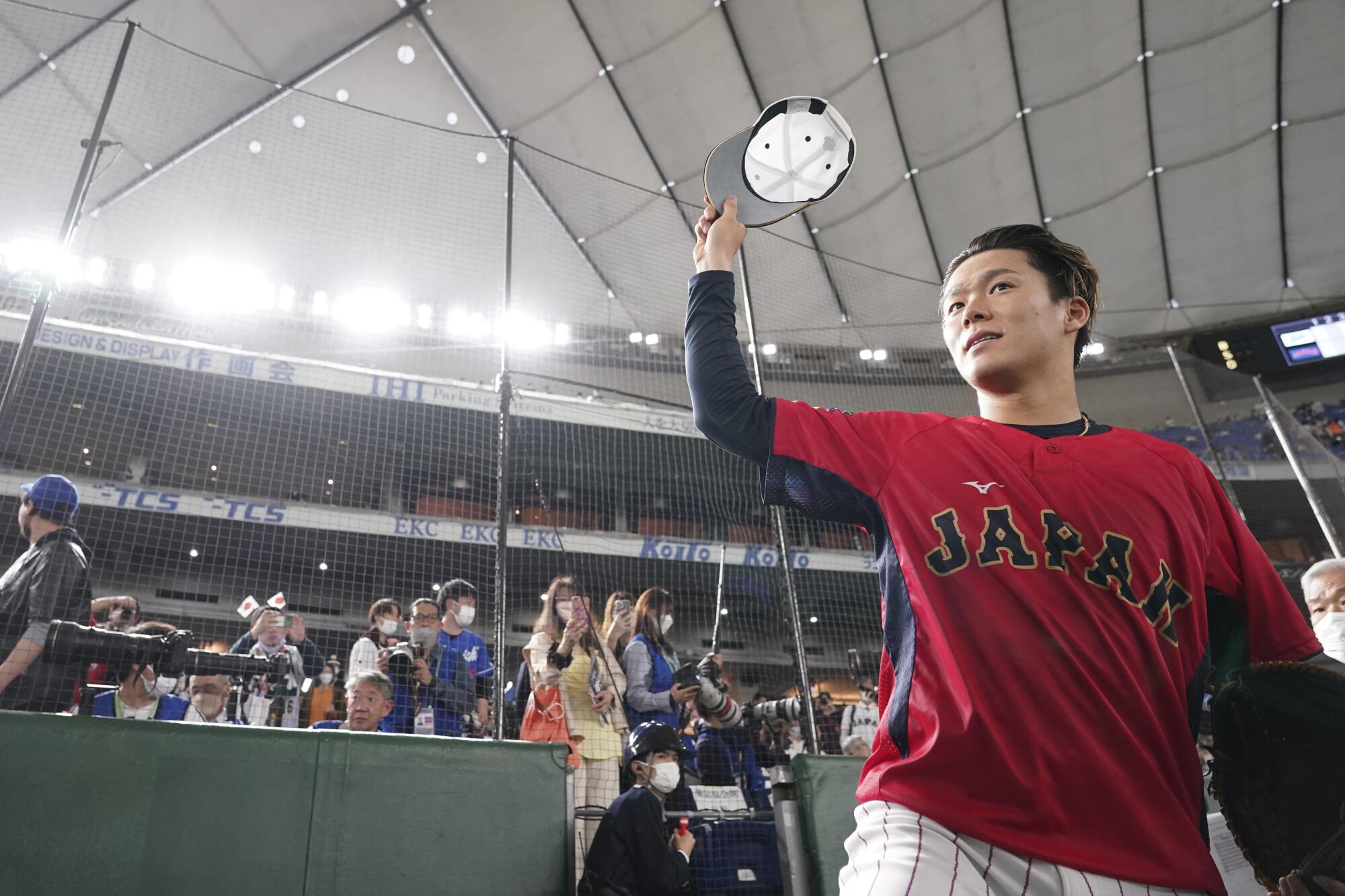
Shunpeita Yamashita, a 6-foot-3 right-hander with a 100 mph fastball who could be Japan’s next great pitching export, said Yamamoto was always open to offering him advice. The 21-year-old Yamashita said he particularly appreciated how well Yamamoto communicated with the younger players on the team.
Photographs were recently posted on social media of the Buffaloes players in Dodgers shirts with their fingers forming interlocking “L.A.” symbols. The gear, it turns out, was shipped to them by Yamamoto.
Even the groundskeeper was enamored with Yamamoto, as Yosuke Iwata described him as one of the least-demanding superstars he encountered in his 19 seasons with the team.
“Some pitchers are like, ‘If the mound isn’t like this, I can’t pitch,’” Iwata said.
Yoshinobu Yamamoto was tagged for five earned runs and six hits in three innings of work, throwing only 32 of his 58 pitches for strikes.
Yamamoto was never like that.
“He never acted big,” Iwata said. “He never changed. Even when he performed well, he didn’t change.”
Iwata said he wanted Yamamoto to succeed in the major leagues. Many players said the same. They all sounded certain he would.
After Yamamoto was hit hard in a recent spring-training game, Buffaloes players noted the high standards to which he holds himself. They pointed to his capacity for unflinching self-examination. They mentioned his unmatched feel for his own body.
In short, they vouched for his ability to change. If he could make adjustments when no one wanted him to, they reasoned, he should be able to make them now.

More to Read
Are you a true-blue fan?
Get our Dodgers Dugout newsletter for insights, news and much more.
You may occasionally receive promotional content from the Los Angeles Times.

